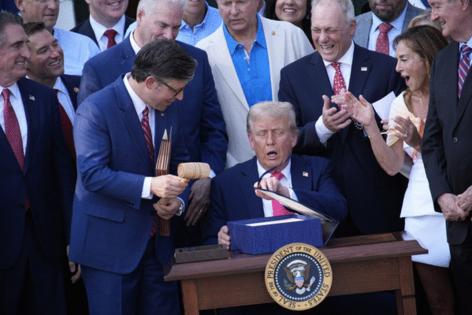Trump signs his tax-and-spend bill at White House ceremony
Published in Political News
President Donald Trump signed his $3.4 trillion budget bill into law Friday, enshrining an extension of tax cuts, temporary new breaks for tipped workers and funding to crack down on illegal immigration.
The package encompasses a suite of priorities Trump campaigned on in 2024 — and its enactment at a White House ceremony represents a major political victory for the president whose second term was marked until now by executive rather than legislative action.
The legislative milestone reinforces Trump’s grip on the Republican Party, whose Capitol Hill leaders muscled the bill through the House and Senate this week. To reach his July 4 target date, Trump worked the phones and summoned some lawmakers to the White House in a pressure campaign to win over key holdouts.
“It’s really promises made, promises kept,” Trump said before signing the measure at an outdoor ceremony preceded by an Air Force flyover. After citing what he said were his efforts to restore American strength on the world stage, he called the bill “the biggest victory yet.”
Republican legislative leaders overcame narrow margins, unified opposition from congressional Democrats and objections by fiscal conservatives and moderates to pass the bill before Trump’s deadline, which coincided with the Independence Day holiday.
Yet the legislative success comes with political risks for the president and Republicans with consequences that could rumble for years.
The fiscal package imposes steep cuts and new administrative procedures on nutrition assistance and health programs that provide a safety net for working and unemployed Americans.
The nonpartisan Congressional Budget Office estimates the changes will push some 11.8 million Americans off the Medicaid health insurance program. Others have warned that reduced hospital payments could shut down rural medical facilities.
The cuts have helped sour the public on Trump’s plan, with polls showing it’s unpopular.
Some Senate Republicans have warned the party could face a backlash at the ballot box. Democrats have vowed to wield the bill against Republicans in the buildup to next year’s midterm elections.
Trump and his supporters cast the measure as fuel for an economic renaissance, shrugging off nonpartisan projections that the package will drive up the national debt.
“Our country is going to be a rocket ship economically,” Trump said, while dismissing polls that suggest the measure is unpopular.
Administration officials say the policy shift is just one piece of the president’s economic plan — with tariff revenue, regulatory repeals and increased U.S. energy production also set to bolster growth.
Much of the new law’s expense comes in the form of tax cuts — including an extension of the breaks enacted during Trump’s first term as well as new ones for tips, certain car loans and overtime work.
The measure contains expanded tax breaks for seniors and parents, and raises a state and local tax deduction to $40,000 for the next five years from the existing $10,000 limit. That increase was highly sought after by House Republicans from high-tax states such as New York, New Jersey and California.
The package’s $4.5 trillion in tax cuts were partly offset by spending reductions, including cutting off incentives for renewable power and electric vehicles that had prompted companies to invest in new factories, wind farms and solar arrays nationwide.
Nearly $1 trillion would be cut from Medicaid by imposing a new work requirement for able-bodied adults without children, imposing co-payments and limiting federal reimbursements to states. Food-aid work requirements would expand and states with error-prone systems would be penalized.
Trump’s bill also delivers hundreds of billions in new military funding and allows increased spending on immigration enforcement.
_____
©2025 Bloomberg L.P. Visit bloomberg.com. Distributed by Tribune Content Agency, LLC.

























































Comments